A Study on Islam's Influence on OCD and Anxiety in Bahrain
VerifiedAdded on 2023/06/03
|13
|3497
|387
Report
AI Summary
This report investigates the impact of Islam on obsessive-compulsive disorder (OCD) and anxiety disorders in Bahrain, a MENA country. It aims to analyze how religion affects the prevalence and incidence of these disorders among different ethnic groups, determine the influence of religiosity and spirituality on their development and prognosis, evaluate the psychological distress caused by these disorders in relation to religion, and assess how religion impacts health-seeking behavior and treatment outcomes. The study employs a cross-sectional design with structured interviews and questionnaires, focusing on two ethnic groups practicing Islam. Data analysis will use grounded theory to formulate a theory explaining the relationship between Islamic religion and OCD and anxiety disorders. Ethical considerations, including informed consent and confidentiality, are prioritized. The research intends to disseminate its findings to raise awareness and improve practices related to mental health in the region. Desklib provides access to this and other solved assignments for students.
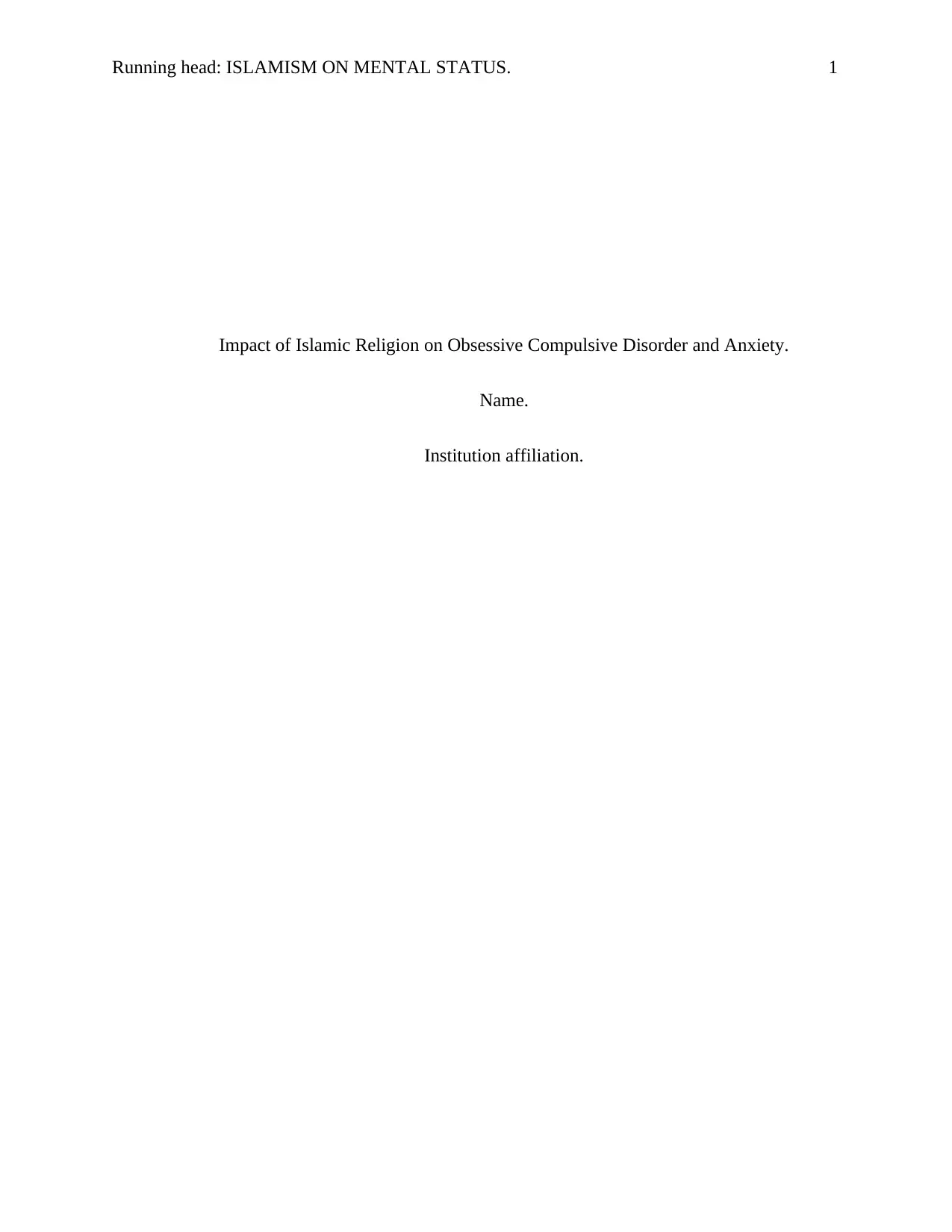
Running head: ISLAMISM ON MENTAL STATUS. 1
Impact of Islamic Religion on Obsessive Compulsive Disorder and Anxiety.
Name.
Institution affiliation.
Impact of Islamic Religion on Obsessive Compulsive Disorder and Anxiety.
Name.
Institution affiliation.
Paraphrase This Document
Need a fresh take? Get an instant paraphrase of this document with our AI Paraphraser
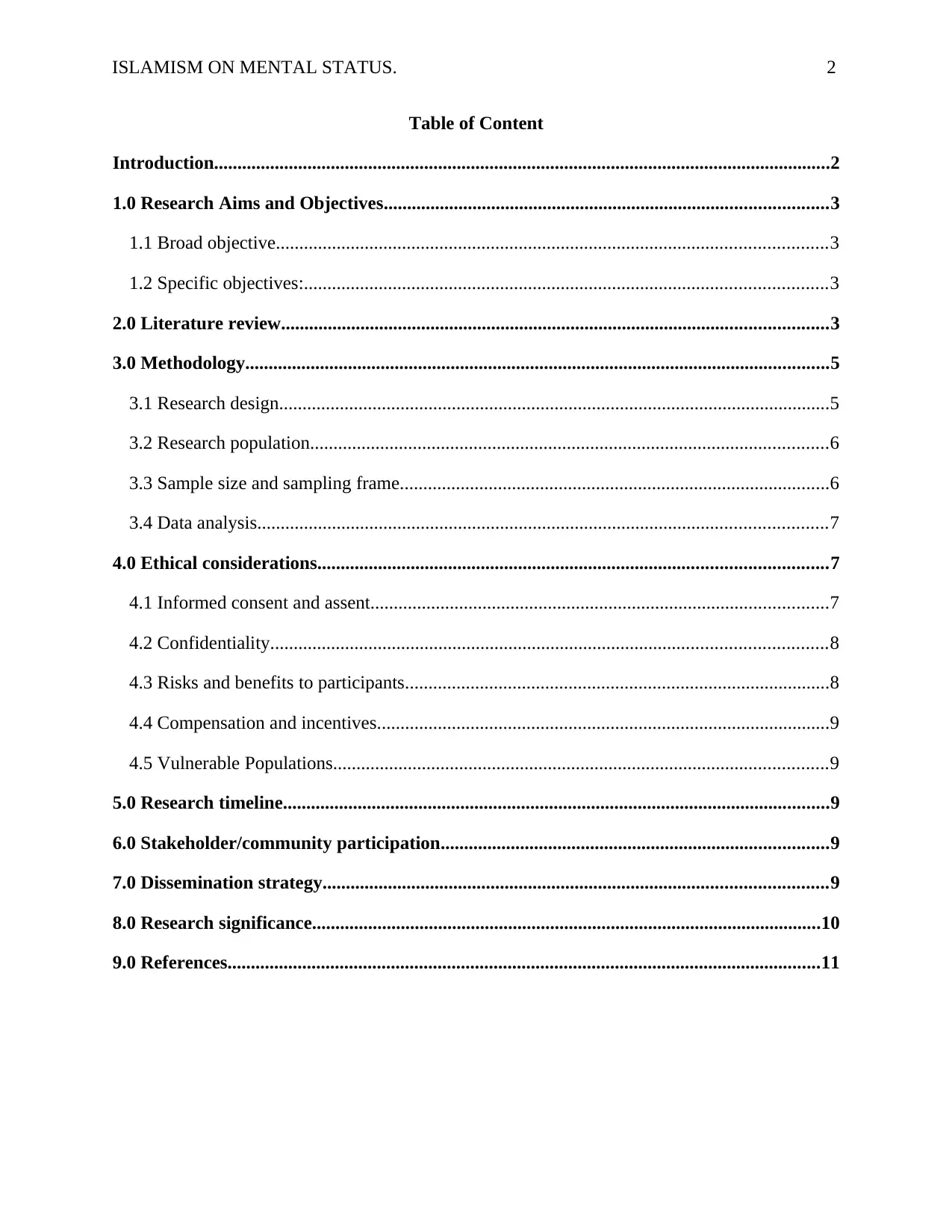
ISLAMISM ON MENTAL STATUS. 2
Table of Content
Introduction....................................................................................................................................2
1.0 Research Aims and Objectives...............................................................................................3
1.1 Broad objective......................................................................................................................3
1.2 Specific objectives:................................................................................................................3
2.0 Literature review.....................................................................................................................3
3.0 Methodology.............................................................................................................................5
3.1 Research design......................................................................................................................5
3.2 Research population...............................................................................................................6
3.3 Sample size and sampling frame............................................................................................6
3.4 Data analysis..........................................................................................................................7
4.0 Ethical considerations.............................................................................................................7
4.1 Informed consent and assent..................................................................................................7
4.2 Confidentiality.......................................................................................................................8
4.3 Risks and benefits to participants...........................................................................................8
4.4 Compensation and incentives.................................................................................................9
4.5 Vulnerable Populations..........................................................................................................9
5.0 Research timeline.....................................................................................................................9
6.0 Stakeholder/community participation...................................................................................9
7.0 Dissemination strategy............................................................................................................9
8.0 Research significance.............................................................................................................10
9.0 References...............................................................................................................................11
Table of Content
Introduction....................................................................................................................................2
1.0 Research Aims and Objectives...............................................................................................3
1.1 Broad objective......................................................................................................................3
1.2 Specific objectives:................................................................................................................3
2.0 Literature review.....................................................................................................................3
3.0 Methodology.............................................................................................................................5
3.1 Research design......................................................................................................................5
3.2 Research population...............................................................................................................6
3.3 Sample size and sampling frame............................................................................................6
3.4 Data analysis..........................................................................................................................7
4.0 Ethical considerations.............................................................................................................7
4.1 Informed consent and assent..................................................................................................7
4.2 Confidentiality.......................................................................................................................8
4.3 Risks and benefits to participants...........................................................................................8
4.4 Compensation and incentives.................................................................................................9
4.5 Vulnerable Populations..........................................................................................................9
5.0 Research timeline.....................................................................................................................9
6.0 Stakeholder/community participation...................................................................................9
7.0 Dissemination strategy............................................................................................................9
8.0 Research significance.............................................................................................................10
9.0 References...............................................................................................................................11
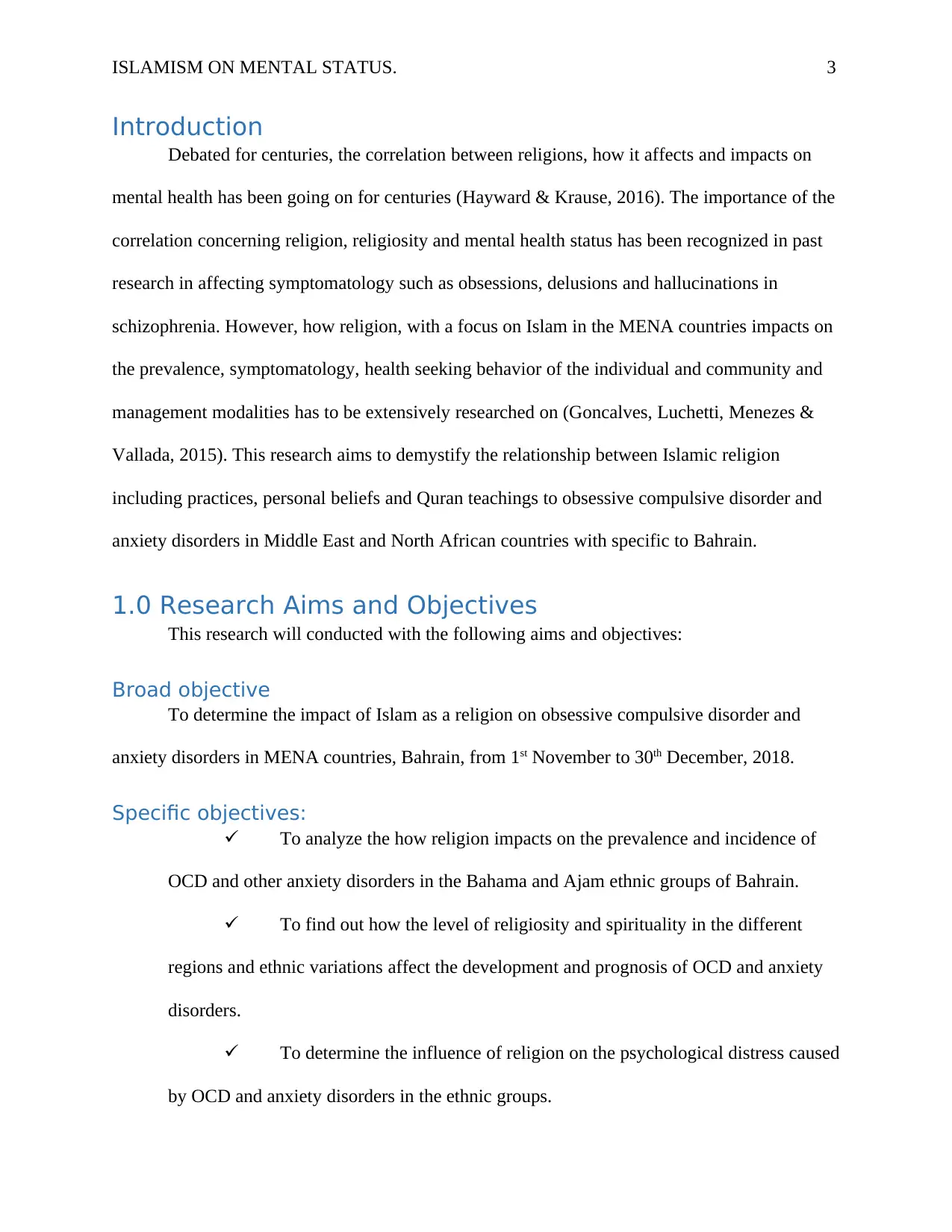
ISLAMISM ON MENTAL STATUS. 3
Introduction
Debated for centuries, the correlation between religions, how it affects and impacts on
mental health has been going on for centuries (Hayward & Krause, 2016). The importance of the
correlation concerning religion, religiosity and mental health status has been recognized in past
research in affecting symptomatology such as obsessions, delusions and hallucinations in
schizophrenia. However, how religion, with a focus on Islam in the MENA countries impacts on
the prevalence, symptomatology, health seeking behavior of the individual and community and
management modalities has to be extensively researched on (Goncalves, Luchetti, Menezes &
Vallada, 2015). This research aims to demystify the relationship between Islamic religion
including practices, personal beliefs and Quran teachings to obsessive compulsive disorder and
anxiety disorders in Middle East and North African countries with specific to Bahrain.
1.0 Research Aims and Objectives
This research will conducted with the following aims and objectives:
Broad objective
To determine the impact of Islam as a religion on obsessive compulsive disorder and
anxiety disorders in MENA countries, Bahrain, from 1st November to 30th December, 2018.
Specific objectives:
To analyze the how religion impacts on the prevalence and incidence of
OCD and other anxiety disorders in the Bahama and Ajam ethnic groups of Bahrain.
To find out how the level of religiosity and spirituality in the different
regions and ethnic variations affect the development and prognosis of OCD and anxiety
disorders.
To determine the influence of religion on the psychological distress caused
by OCD and anxiety disorders in the ethnic groups.
Introduction
Debated for centuries, the correlation between religions, how it affects and impacts on
mental health has been going on for centuries (Hayward & Krause, 2016). The importance of the
correlation concerning religion, religiosity and mental health status has been recognized in past
research in affecting symptomatology such as obsessions, delusions and hallucinations in
schizophrenia. However, how religion, with a focus on Islam in the MENA countries impacts on
the prevalence, symptomatology, health seeking behavior of the individual and community and
management modalities has to be extensively researched on (Goncalves, Luchetti, Menezes &
Vallada, 2015). This research aims to demystify the relationship between Islamic religion
including practices, personal beliefs and Quran teachings to obsessive compulsive disorder and
anxiety disorders in Middle East and North African countries with specific to Bahrain.
1.0 Research Aims and Objectives
This research will conducted with the following aims and objectives:
Broad objective
To determine the impact of Islam as a religion on obsessive compulsive disorder and
anxiety disorders in MENA countries, Bahrain, from 1st November to 30th December, 2018.
Specific objectives:
To analyze the how religion impacts on the prevalence and incidence of
OCD and other anxiety disorders in the Bahama and Ajam ethnic groups of Bahrain.
To find out how the level of religiosity and spirituality in the different
regions and ethnic variations affect the development and prognosis of OCD and anxiety
disorders.
To determine the influence of religion on the psychological distress caused
by OCD and anxiety disorders in the ethnic groups.
⊘ This is a preview!⊘
Do you want full access?
Subscribe today to unlock all pages.

Trusted by 1+ million students worldwide
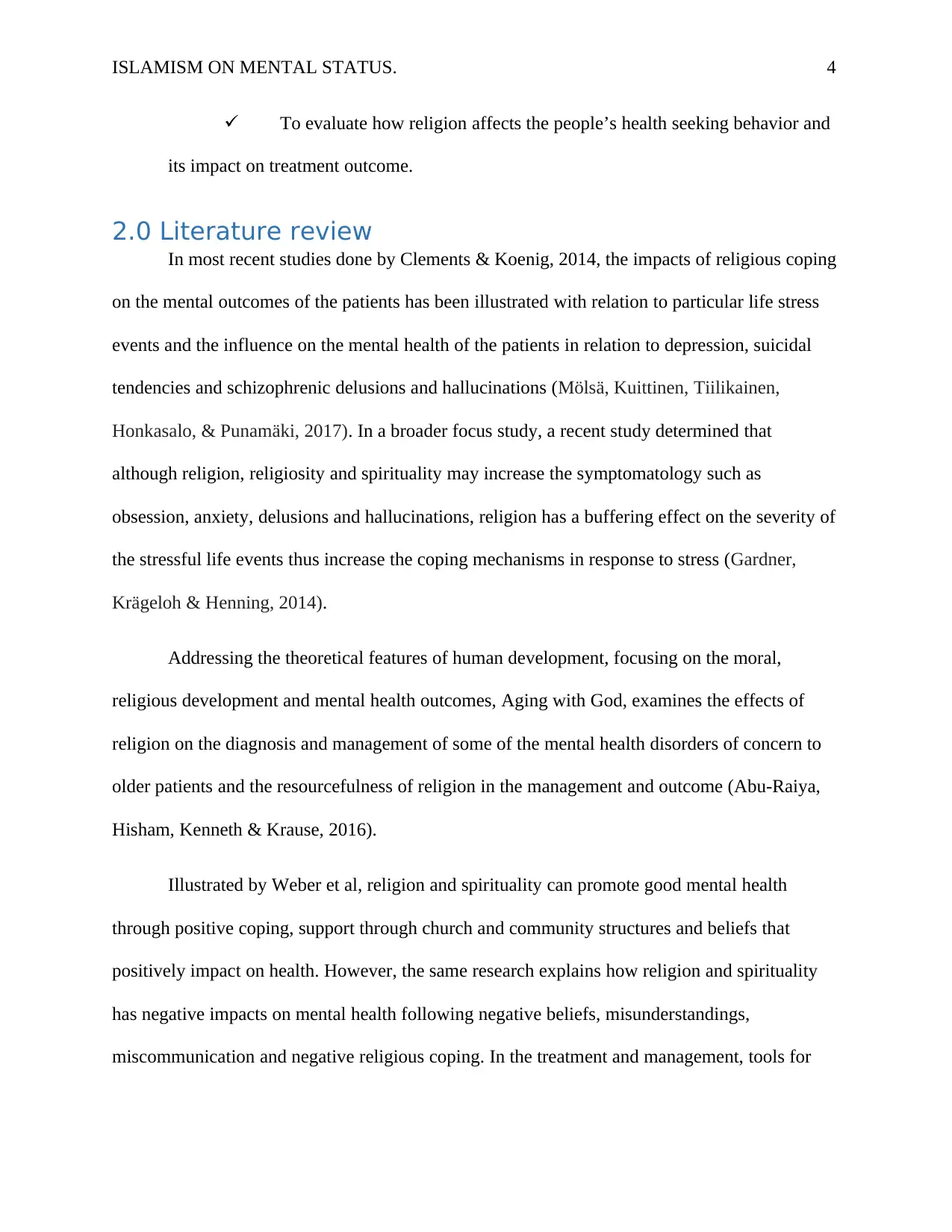
ISLAMISM ON MENTAL STATUS. 4
To evaluate how religion affects the people’s health seeking behavior and
its impact on treatment outcome.
2.0 Literature review
In most recent studies done by Clements & Koenig, 2014, the impacts of religious coping
on the mental outcomes of the patients has been illustrated with relation to particular life stress
events and the influence on the mental health of the patients in relation to depression, suicidal
tendencies and schizophrenic delusions and hallucinations (Mölsä, Kuittinen, Tiilikainen,
Honkasalo, & Punamäki, 2017). In a broader focus study, a recent study determined that
although religion, religiosity and spirituality may increase the symptomatology such as
obsession, anxiety, delusions and hallucinations, religion has a buffering effect on the severity of
the stressful life events thus increase the coping mechanisms in response to stress (Gardner,
Krägeloh & Henning, 2014).
Addressing the theoretical features of human development, focusing on the moral,
religious development and mental health outcomes, Aging with God, examines the effects of
religion on the diagnosis and management of some of the mental health disorders of concern to
older patients and the resourcefulness of religion in the management and outcome (Abu-Raiya,
Hisham, Kenneth & Krause, 2016).
Illustrated by Weber et al, religion and spirituality can promote good mental health
through positive coping, support through church and community structures and beliefs that
positively impact on health. However, the same research explains how religion and spirituality
has negative impacts on mental health following negative beliefs, misunderstandings,
miscommunication and negative religious coping. In the treatment and management, tools for
To evaluate how religion affects the people’s health seeking behavior and
its impact on treatment outcome.
2.0 Literature review
In most recent studies done by Clements & Koenig, 2014, the impacts of religious coping
on the mental outcomes of the patients has been illustrated with relation to particular life stress
events and the influence on the mental health of the patients in relation to depression, suicidal
tendencies and schizophrenic delusions and hallucinations (Mölsä, Kuittinen, Tiilikainen,
Honkasalo, & Punamäki, 2017). In a broader focus study, a recent study determined that
although religion, religiosity and spirituality may increase the symptomatology such as
obsession, anxiety, delusions and hallucinations, religion has a buffering effect on the severity of
the stressful life events thus increase the coping mechanisms in response to stress (Gardner,
Krägeloh & Henning, 2014).
Addressing the theoretical features of human development, focusing on the moral,
religious development and mental health outcomes, Aging with God, examines the effects of
religion on the diagnosis and management of some of the mental health disorders of concern to
older patients and the resourcefulness of religion in the management and outcome (Abu-Raiya,
Hisham, Kenneth & Krause, 2016).
Illustrated by Weber et al, religion and spirituality can promote good mental health
through positive coping, support through church and community structures and beliefs that
positively impact on health. However, the same research explains how religion and spirituality
has negative impacts on mental health following negative beliefs, misunderstandings,
miscommunication and negative religious coping. In the treatment and management, tools for
Paraphrase This Document
Need a fresh take? Get an instant paraphrase of this document with our AI Paraphraser
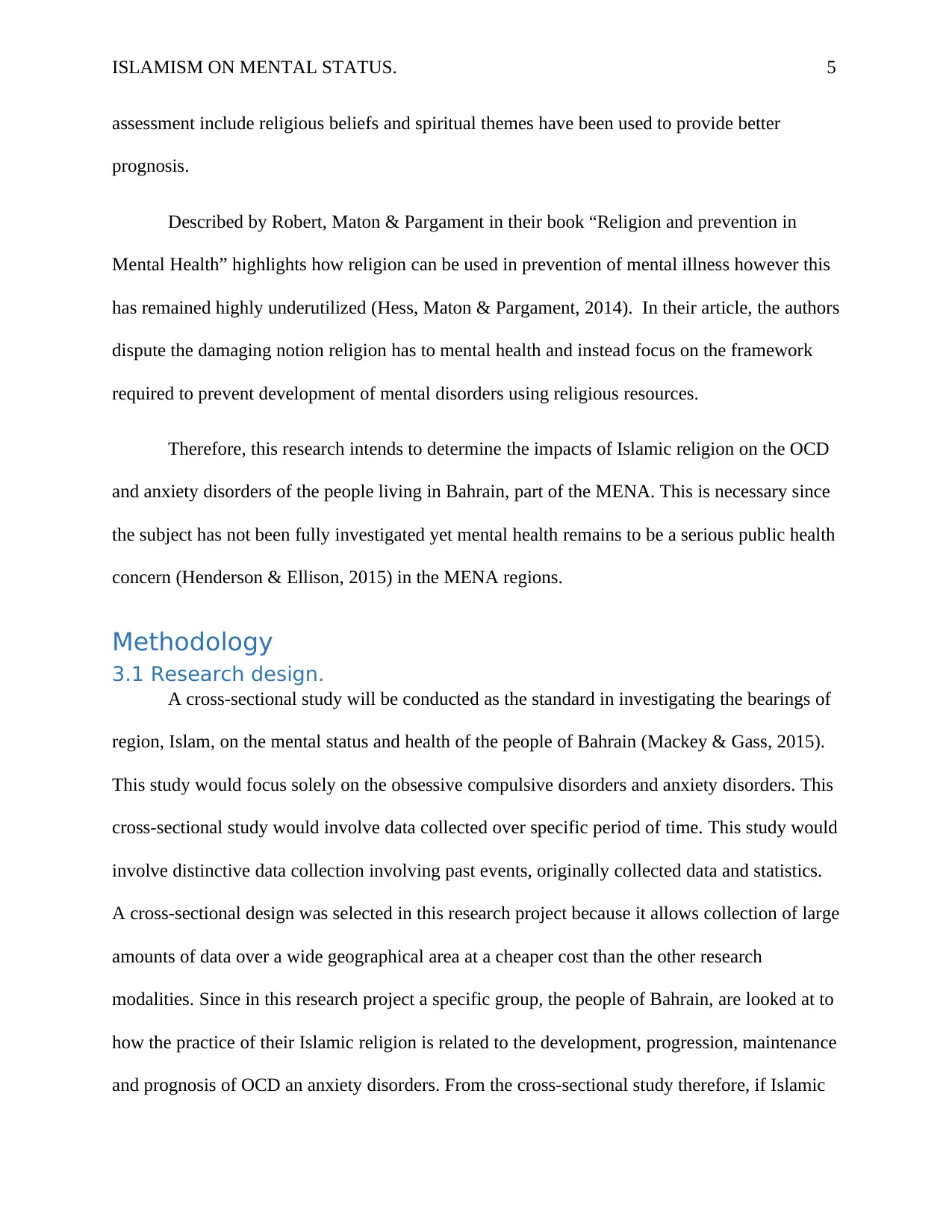
ISLAMISM ON MENTAL STATUS. 5
assessment include religious beliefs and spiritual themes have been used to provide better
prognosis.
Described by Robert, Maton & Pargament in their book “Religion and prevention in
Mental Health” highlights how religion can be used in prevention of mental illness however this
has remained highly underutilized (Hess, Maton & Pargament, 2014). In their article, the authors
dispute the damaging notion religion has to mental health and instead focus on the framework
required to prevent development of mental disorders using religious resources.
Therefore, this research intends to determine the impacts of Islamic religion on the OCD
and anxiety disorders of the people living in Bahrain, part of the MENA. This is necessary since
the subject has not been fully investigated yet mental health remains to be a serious public health
concern (Henderson & Ellison, 2015) in the MENA regions.
Methodology
3.1 Research design.
A cross-sectional study will be conducted as the standard in investigating the bearings of
region, Islam, on the mental status and health of the people of Bahrain (Mackey & Gass, 2015).
This study would focus solely on the obsessive compulsive disorders and anxiety disorders. This
cross-sectional study would involve data collected over specific period of time. This study would
involve distinctive data collection involving past events, originally collected data and statistics.
A cross-sectional design was selected in this research project because it allows collection of large
amounts of data over a wide geographical area at a cheaper cost than the other research
modalities. Since in this research project a specific group, the people of Bahrain, are looked at to
how the practice of their Islamic religion is related to the development, progression, maintenance
and prognosis of OCD an anxiety disorders. From the cross-sectional study therefore, if Islamic
assessment include religious beliefs and spiritual themes have been used to provide better
prognosis.
Described by Robert, Maton & Pargament in their book “Religion and prevention in
Mental Health” highlights how religion can be used in prevention of mental illness however this
has remained highly underutilized (Hess, Maton & Pargament, 2014). In their article, the authors
dispute the damaging notion religion has to mental health and instead focus on the framework
required to prevent development of mental disorders using religious resources.
Therefore, this research intends to determine the impacts of Islamic religion on the OCD
and anxiety disorders of the people living in Bahrain, part of the MENA. This is necessary since
the subject has not been fully investigated yet mental health remains to be a serious public health
concern (Henderson & Ellison, 2015) in the MENA regions.
Methodology
3.1 Research design.
A cross-sectional study will be conducted as the standard in investigating the bearings of
region, Islam, on the mental status and health of the people of Bahrain (Mackey & Gass, 2015).
This study would focus solely on the obsessive compulsive disorders and anxiety disorders. This
cross-sectional study would involve data collected over specific period of time. This study would
involve distinctive data collection involving past events, originally collected data and statistics.
A cross-sectional design was selected in this research project because it allows collection of large
amounts of data over a wide geographical area at a cheaper cost than the other research
modalities. Since in this research project a specific group, the people of Bahrain, are looked at to
how the practice of their Islamic religion is related to the development, progression, maintenance
and prognosis of OCD an anxiety disorders. From the cross-sectional study therefore, if Islamic
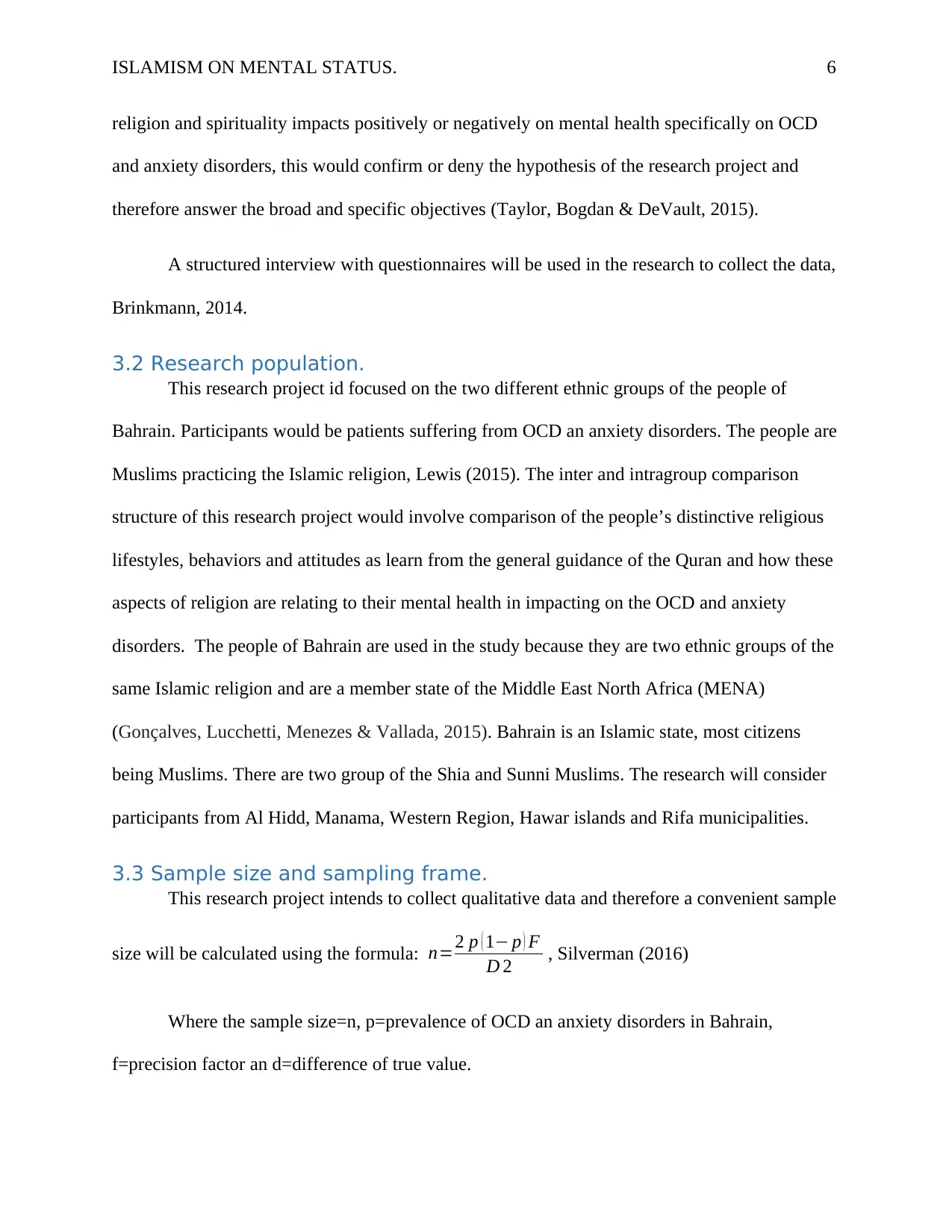
ISLAMISM ON MENTAL STATUS. 6
religion and spirituality impacts positively or negatively on mental health specifically on OCD
and anxiety disorders, this would confirm or deny the hypothesis of the research project and
therefore answer the broad and specific objectives (Taylor, Bogdan & DeVault, 2015).
A structured interview with questionnaires will be used in the research to collect the data,
Brinkmann, 2014.
3.2 Research population.
This research project id focused on the two different ethnic groups of the people of
Bahrain. Participants would be patients suffering from OCD an anxiety disorders. The people are
Muslims practicing the Islamic religion, Lewis (2015). The inter and intragroup comparison
structure of this research project would involve comparison of the people’s distinctive religious
lifestyles, behaviors and attitudes as learn from the general guidance of the Quran and how these
aspects of religion are relating to their mental health in impacting on the OCD and anxiety
disorders. The people of Bahrain are used in the study because they are two ethnic groups of the
same Islamic religion and are a member state of the Middle East North Africa (MENA)
(Gonçalves, Lucchetti, Menezes & Vallada, 2015). Bahrain is an Islamic state, most citizens
being Muslims. There are two group of the Shia and Sunni Muslims. The research will consider
participants from Al Hidd, Manama, Western Region, Hawar islands and Rifa municipalities.
3.3 Sample size and sampling frame.
This research project intends to collect qualitative data and therefore a convenient sample
size will be calculated using the formula: n=2 p ( 1− p ) F
D 2 , Silverman (2016)
Where the sample size=n, p=prevalence of OCD an anxiety disorders in Bahrain,
f=precision factor an d=difference of true value.
religion and spirituality impacts positively or negatively on mental health specifically on OCD
and anxiety disorders, this would confirm or deny the hypothesis of the research project and
therefore answer the broad and specific objectives (Taylor, Bogdan & DeVault, 2015).
A structured interview with questionnaires will be used in the research to collect the data,
Brinkmann, 2014.
3.2 Research population.
This research project id focused on the two different ethnic groups of the people of
Bahrain. Participants would be patients suffering from OCD an anxiety disorders. The people are
Muslims practicing the Islamic religion, Lewis (2015). The inter and intragroup comparison
structure of this research project would involve comparison of the people’s distinctive religious
lifestyles, behaviors and attitudes as learn from the general guidance of the Quran and how these
aspects of religion are relating to their mental health in impacting on the OCD and anxiety
disorders. The people of Bahrain are used in the study because they are two ethnic groups of the
same Islamic religion and are a member state of the Middle East North Africa (MENA)
(Gonçalves, Lucchetti, Menezes & Vallada, 2015). Bahrain is an Islamic state, most citizens
being Muslims. There are two group of the Shia and Sunni Muslims. The research will consider
participants from Al Hidd, Manama, Western Region, Hawar islands and Rifa municipalities.
3.3 Sample size and sampling frame.
This research project intends to collect qualitative data and therefore a convenient sample
size will be calculated using the formula: n=2 p ( 1− p ) F
D 2 , Silverman (2016)
Where the sample size=n, p=prevalence of OCD an anxiety disorders in Bahrain,
f=precision factor an d=difference of true value.
⊘ This is a preview!⊘
Do you want full access?
Subscribe today to unlock all pages.

Trusted by 1+ million students worldwide
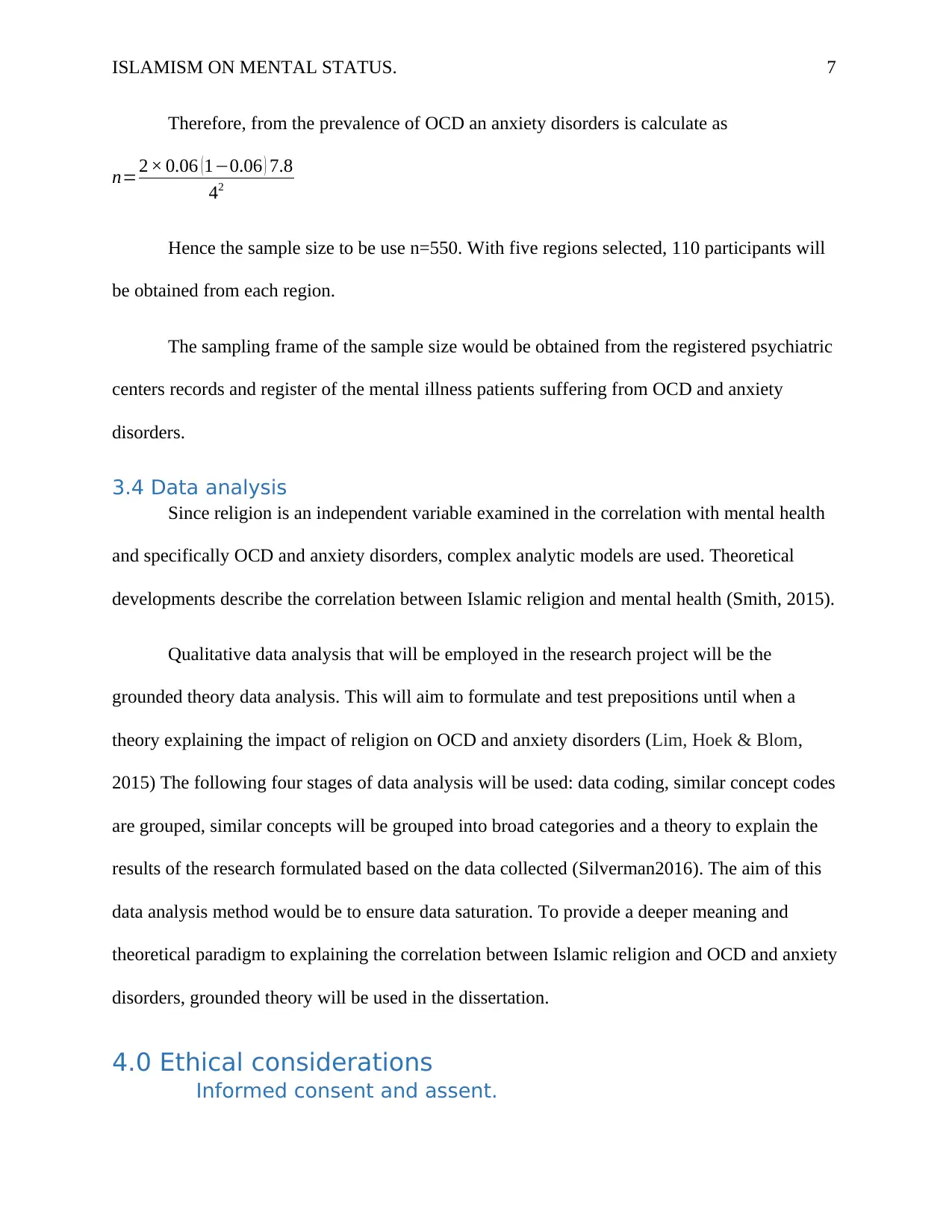
ISLAMISM ON MENTAL STATUS. 7
Therefore, from the prevalence of OCD an anxiety disorders is calculate as
n=2 × 0.06 (1−0.06 ) 7.8
42
Hence the sample size to be use n=550. With five regions selected, 110 participants will
be obtained from each region.
The sampling frame of the sample size would be obtained from the registered psychiatric
centers records and register of the mental illness patients suffering from OCD and anxiety
disorders.
3.4 Data analysis
Since religion is an independent variable examined in the correlation with mental health
and specifically OCD and anxiety disorders, complex analytic models are used. Theoretical
developments describe the correlation between Islamic religion and mental health (Smith, 2015).
Qualitative data analysis that will be employed in the research project will be the
grounded theory data analysis. This will aim to formulate and test prepositions until when a
theory explaining the impact of religion on OCD and anxiety disorders (Lim, Hoek & Blom,
2015) The following four stages of data analysis will be used: data coding, similar concept codes
are grouped, similar concepts will be grouped into broad categories and a theory to explain the
results of the research formulated based on the data collected (Silverman2016). The aim of this
data analysis method would be to ensure data saturation. To provide a deeper meaning and
theoretical paradigm to explaining the correlation between Islamic religion and OCD and anxiety
disorders, grounded theory will be used in the dissertation.
4.0 Ethical considerations
Informed consent and assent.
Therefore, from the prevalence of OCD an anxiety disorders is calculate as
n=2 × 0.06 (1−0.06 ) 7.8
42
Hence the sample size to be use n=550. With five regions selected, 110 participants will
be obtained from each region.
The sampling frame of the sample size would be obtained from the registered psychiatric
centers records and register of the mental illness patients suffering from OCD and anxiety
disorders.
3.4 Data analysis
Since religion is an independent variable examined in the correlation with mental health
and specifically OCD and anxiety disorders, complex analytic models are used. Theoretical
developments describe the correlation between Islamic religion and mental health (Smith, 2015).
Qualitative data analysis that will be employed in the research project will be the
grounded theory data analysis. This will aim to formulate and test prepositions until when a
theory explaining the impact of religion on OCD and anxiety disorders (Lim, Hoek & Blom,
2015) The following four stages of data analysis will be used: data coding, similar concept codes
are grouped, similar concepts will be grouped into broad categories and a theory to explain the
results of the research formulated based on the data collected (Silverman2016). The aim of this
data analysis method would be to ensure data saturation. To provide a deeper meaning and
theoretical paradigm to explaining the correlation between Islamic religion and OCD and anxiety
disorders, grounded theory will be used in the dissertation.
4.0 Ethical considerations
Informed consent and assent.
Paraphrase This Document
Need a fresh take? Get an instant paraphrase of this document with our AI Paraphraser
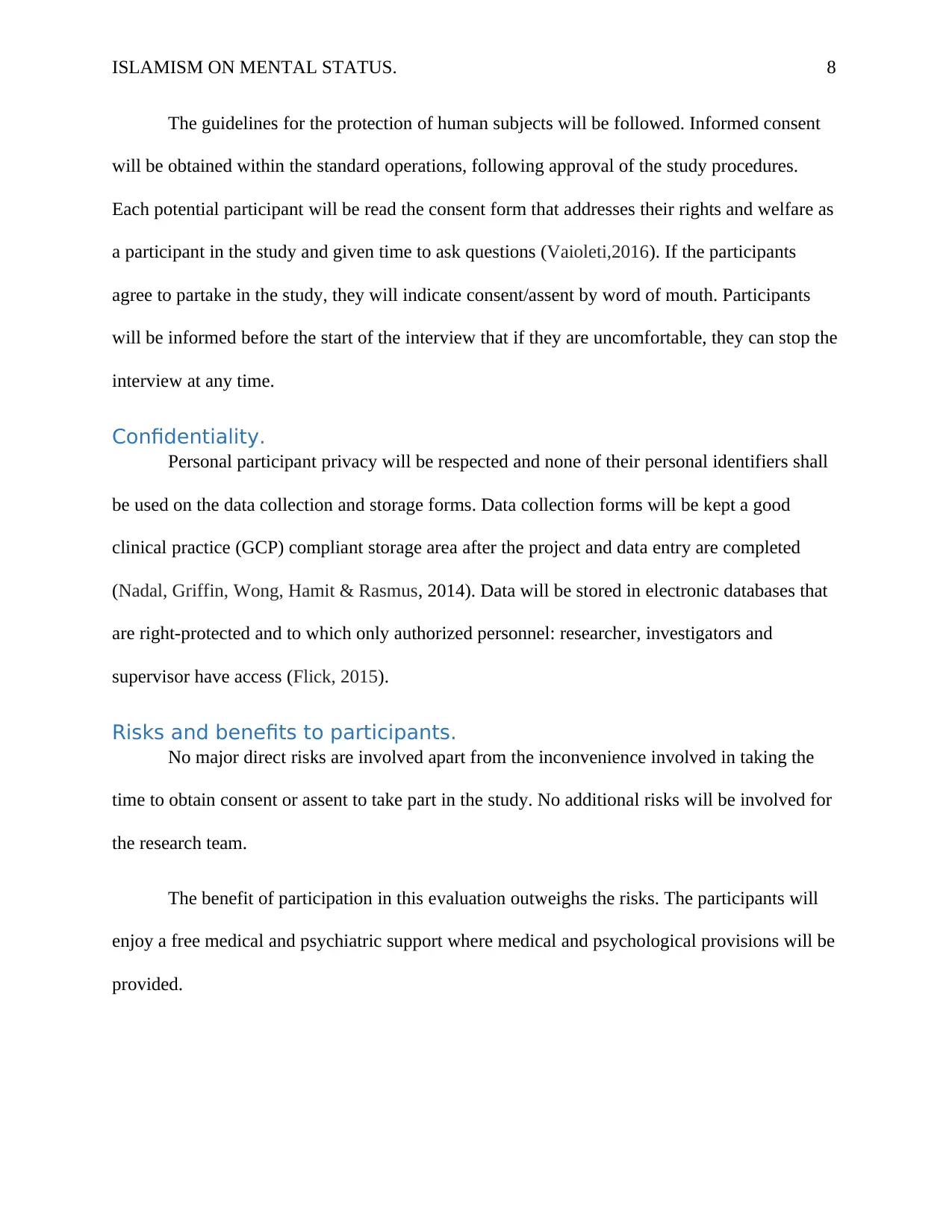
ISLAMISM ON MENTAL STATUS. 8
The guidelines for the protection of human subjects will be followed. Informed consent
will be obtained within the standard operations, following approval of the study procedures.
Each potential participant will be read the consent form that addresses their rights and welfare as
a participant in the study and given time to ask questions (Vaioleti,2016). If the participants
agree to partake in the study, they will indicate consent/assent by word of mouth. Participants
will be informed before the start of the interview that if they are uncomfortable, they can stop the
interview at any time.
Confidentiality.
Personal participant privacy will be respected and none of their personal identifiers shall
be used on the data collection and storage forms. Data collection forms will be kept a good
clinical practice (GCP) compliant storage area after the project and data entry are completed
(Nadal, Griffin, Wong, Hamit & Rasmus, 2014). Data will be stored in electronic databases that
are right-protected and to which only authorized personnel: researcher, investigators and
supervisor have access (Flick, 2015).
Risks and benefits to participants.
No major direct risks are involved apart from the inconvenience involved in taking the
time to obtain consent or assent to take part in the study. No additional risks will be involved for
the research team.
The benefit of participation in this evaluation outweighs the risks. The participants will
enjoy a free medical and psychiatric support where medical and psychological provisions will be
provided.
The guidelines for the protection of human subjects will be followed. Informed consent
will be obtained within the standard operations, following approval of the study procedures.
Each potential participant will be read the consent form that addresses their rights and welfare as
a participant in the study and given time to ask questions (Vaioleti,2016). If the participants
agree to partake in the study, they will indicate consent/assent by word of mouth. Participants
will be informed before the start of the interview that if they are uncomfortable, they can stop the
interview at any time.
Confidentiality.
Personal participant privacy will be respected and none of their personal identifiers shall
be used on the data collection and storage forms. Data collection forms will be kept a good
clinical practice (GCP) compliant storage area after the project and data entry are completed
(Nadal, Griffin, Wong, Hamit & Rasmus, 2014). Data will be stored in electronic databases that
are right-protected and to which only authorized personnel: researcher, investigators and
supervisor have access (Flick, 2015).
Risks and benefits to participants.
No major direct risks are involved apart from the inconvenience involved in taking the
time to obtain consent or assent to take part in the study. No additional risks will be involved for
the research team.
The benefit of participation in this evaluation outweighs the risks. The participants will
enjoy a free medical and psychiatric support where medical and psychological provisions will be
provided.
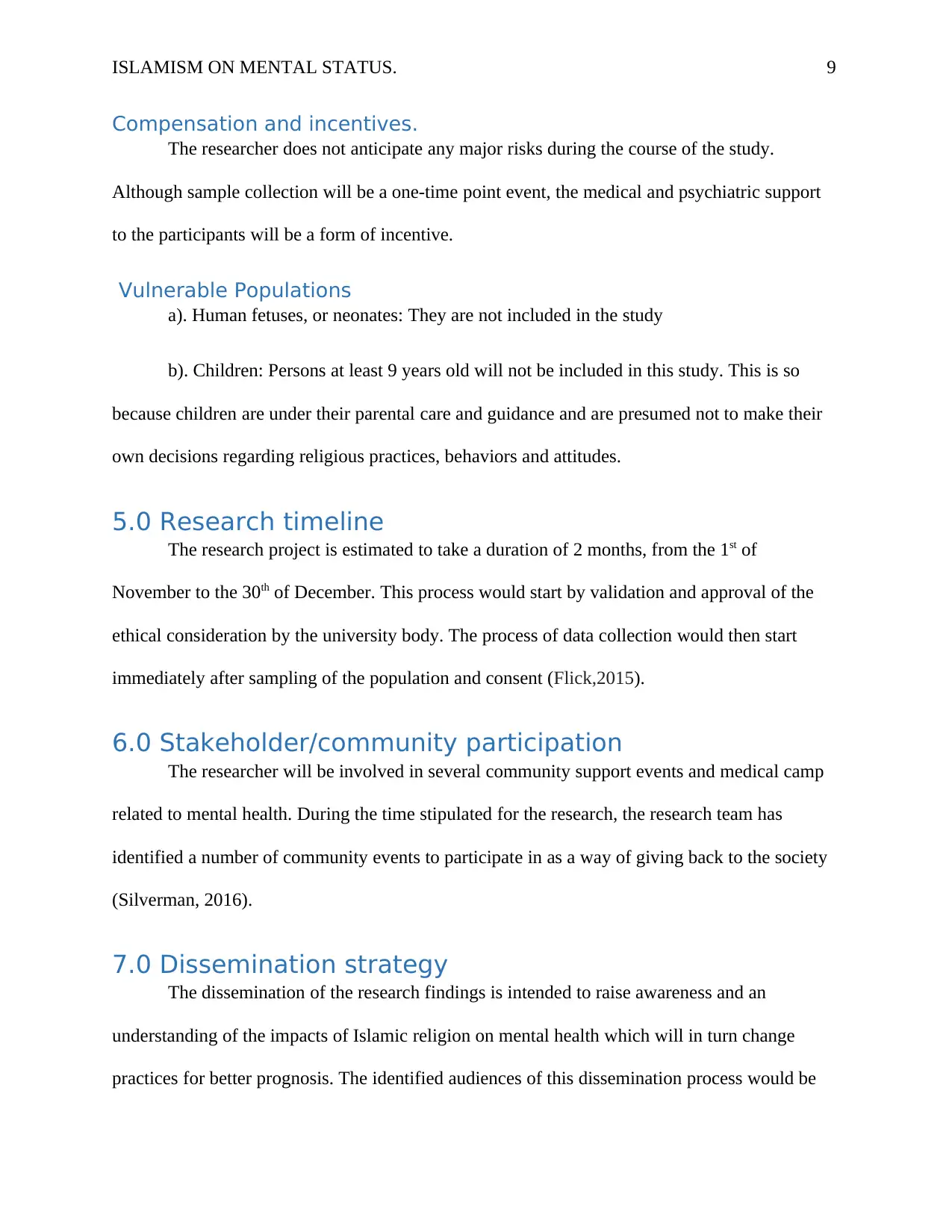
ISLAMISM ON MENTAL STATUS. 9
Compensation and incentives.
The researcher does not anticipate any major risks during the course of the study.
Although sample collection will be a one-time point event, the medical and psychiatric support
to the participants will be a form of incentive.
Vulnerable Populations
a). Human fetuses, or neonates: They are not included in the study
b). Children: Persons at least 9 years old will not be included in this study. This is so
because children are under their parental care and guidance and are presumed not to make their
own decisions regarding religious practices, behaviors and attitudes.
5.0 Research timeline
The research project is estimated to take a duration of 2 months, from the 1st of
November to the 30th of December. This process would start by validation and approval of the
ethical consideration by the university body. The process of data collection would then start
immediately after sampling of the population and consent (Flick,2015).
6.0 Stakeholder/community participation
The researcher will be involved in several community support events and medical camp
related to mental health. During the time stipulated for the research, the research team has
identified a number of community events to participate in as a way of giving back to the society
(Silverman, 2016).
7.0 Dissemination strategy
The dissemination of the research findings is intended to raise awareness and an
understanding of the impacts of Islamic religion on mental health which will in turn change
practices for better prognosis. The identified audiences of this dissemination process would be
Compensation and incentives.
The researcher does not anticipate any major risks during the course of the study.
Although sample collection will be a one-time point event, the medical and psychiatric support
to the participants will be a form of incentive.
Vulnerable Populations
a). Human fetuses, or neonates: They are not included in the study
b). Children: Persons at least 9 years old will not be included in this study. This is so
because children are under their parental care and guidance and are presumed not to make their
own decisions regarding religious practices, behaviors and attitudes.
5.0 Research timeline
The research project is estimated to take a duration of 2 months, from the 1st of
November to the 30th of December. This process would start by validation and approval of the
ethical consideration by the university body. The process of data collection would then start
immediately after sampling of the population and consent (Flick,2015).
6.0 Stakeholder/community participation
The researcher will be involved in several community support events and medical camp
related to mental health. During the time stipulated for the research, the research team has
identified a number of community events to participate in as a way of giving back to the society
(Silverman, 2016).
7.0 Dissemination strategy
The dissemination of the research findings is intended to raise awareness and an
understanding of the impacts of Islamic religion on mental health which will in turn change
practices for better prognosis. The identified audiences of this dissemination process would be
⊘ This is a preview!⊘
Do you want full access?
Subscribe today to unlock all pages.

Trusted by 1+ million students worldwide
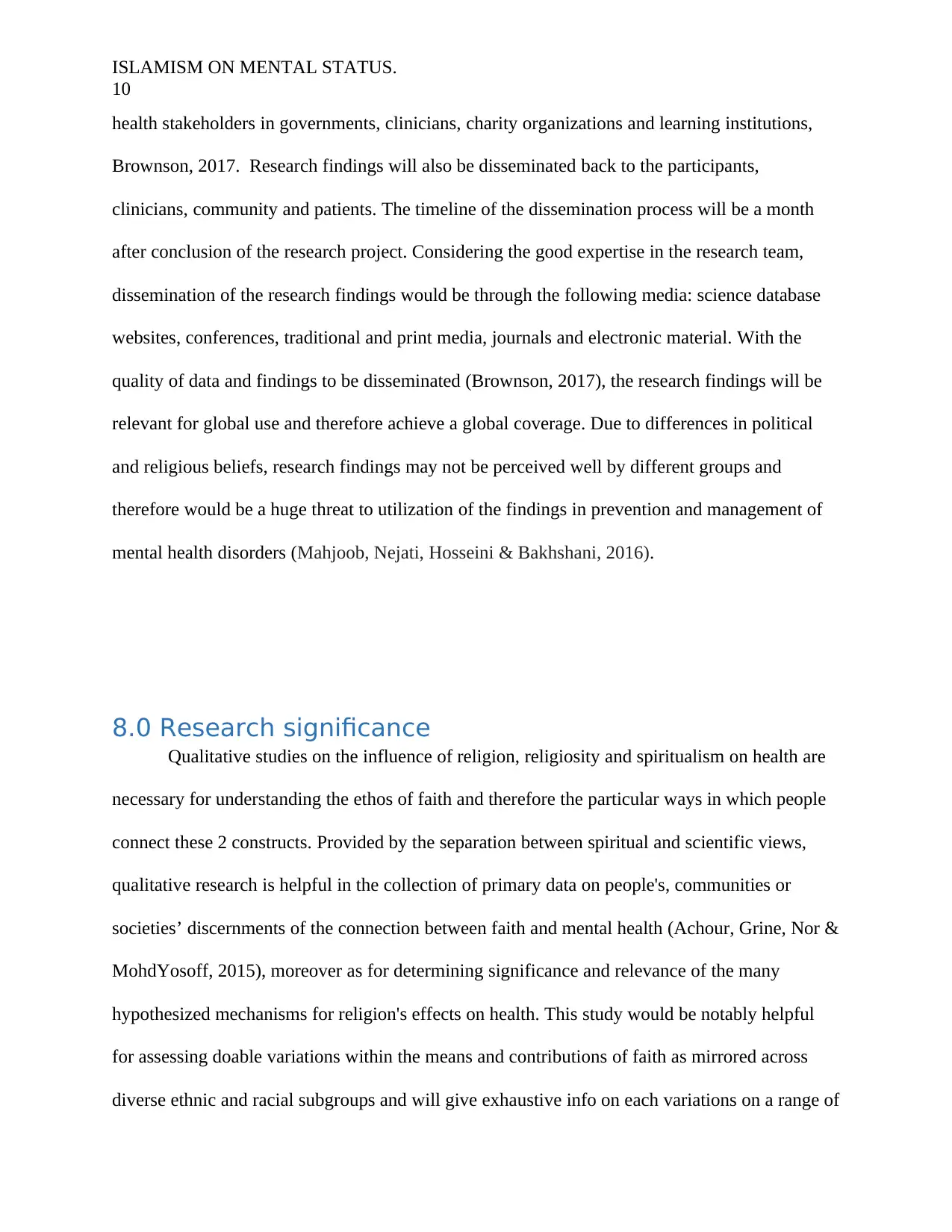
ISLAMISM ON MENTAL STATUS.
10
health stakeholders in governments, clinicians, charity organizations and learning institutions,
Brownson, 2017. Research findings will also be disseminated back to the participants,
clinicians, community and patients. The timeline of the dissemination process will be a month
after conclusion of the research project. Considering the good expertise in the research team,
dissemination of the research findings would be through the following media: science database
websites, conferences, traditional and print media, journals and electronic material. With the
quality of data and findings to be disseminated (Brownson, 2017), the research findings will be
relevant for global use and therefore achieve a global coverage. Due to differences in political
and religious beliefs, research findings may not be perceived well by different groups and
therefore would be a huge threat to utilization of the findings in prevention and management of
mental health disorders (Mahjoob, Nejati, Hosseini & Bakhshani, 2016).
8.0 Research significance
Qualitative studies on the influence of religion, religiosity and spiritualism on health are
necessary for understanding the ethos of faith and therefore the particular ways in which people
connect these 2 constructs. Provided by the separation between spiritual and scientific views,
qualitative research is helpful in the collection of primary data on people's, communities or
societies’ discernments of the connection between faith and mental health (Achour, Grine, Nor &
MohdYosoff, 2015), moreover as for determining significance and relevance of the many
hypothesized mechanisms for religion's effects on health. This study would be notably helpful
for assessing doable variations within the means and contributions of faith as mirrored across
diverse ethnic and racial subgroups and will give exhaustive info on each variations on a range of
10
health stakeholders in governments, clinicians, charity organizations and learning institutions,
Brownson, 2017. Research findings will also be disseminated back to the participants,
clinicians, community and patients. The timeline of the dissemination process will be a month
after conclusion of the research project. Considering the good expertise in the research team,
dissemination of the research findings would be through the following media: science database
websites, conferences, traditional and print media, journals and electronic material. With the
quality of data and findings to be disseminated (Brownson, 2017), the research findings will be
relevant for global use and therefore achieve a global coverage. Due to differences in political
and religious beliefs, research findings may not be perceived well by different groups and
therefore would be a huge threat to utilization of the findings in prevention and management of
mental health disorders (Mahjoob, Nejati, Hosseini & Bakhshani, 2016).
8.0 Research significance
Qualitative studies on the influence of religion, religiosity and spiritualism on health are
necessary for understanding the ethos of faith and therefore the particular ways in which people
connect these 2 constructs. Provided by the separation between spiritual and scientific views,
qualitative research is helpful in the collection of primary data on people's, communities or
societies’ discernments of the connection between faith and mental health (Achour, Grine, Nor &
MohdYosoff, 2015), moreover as for determining significance and relevance of the many
hypothesized mechanisms for religion's effects on health. This study would be notably helpful
for assessing doable variations within the means and contributions of faith as mirrored across
diverse ethnic and racial subgroups and will give exhaustive info on each variations on a range of
Paraphrase This Document
Need a fresh take? Get an instant paraphrase of this document with our AI Paraphraser
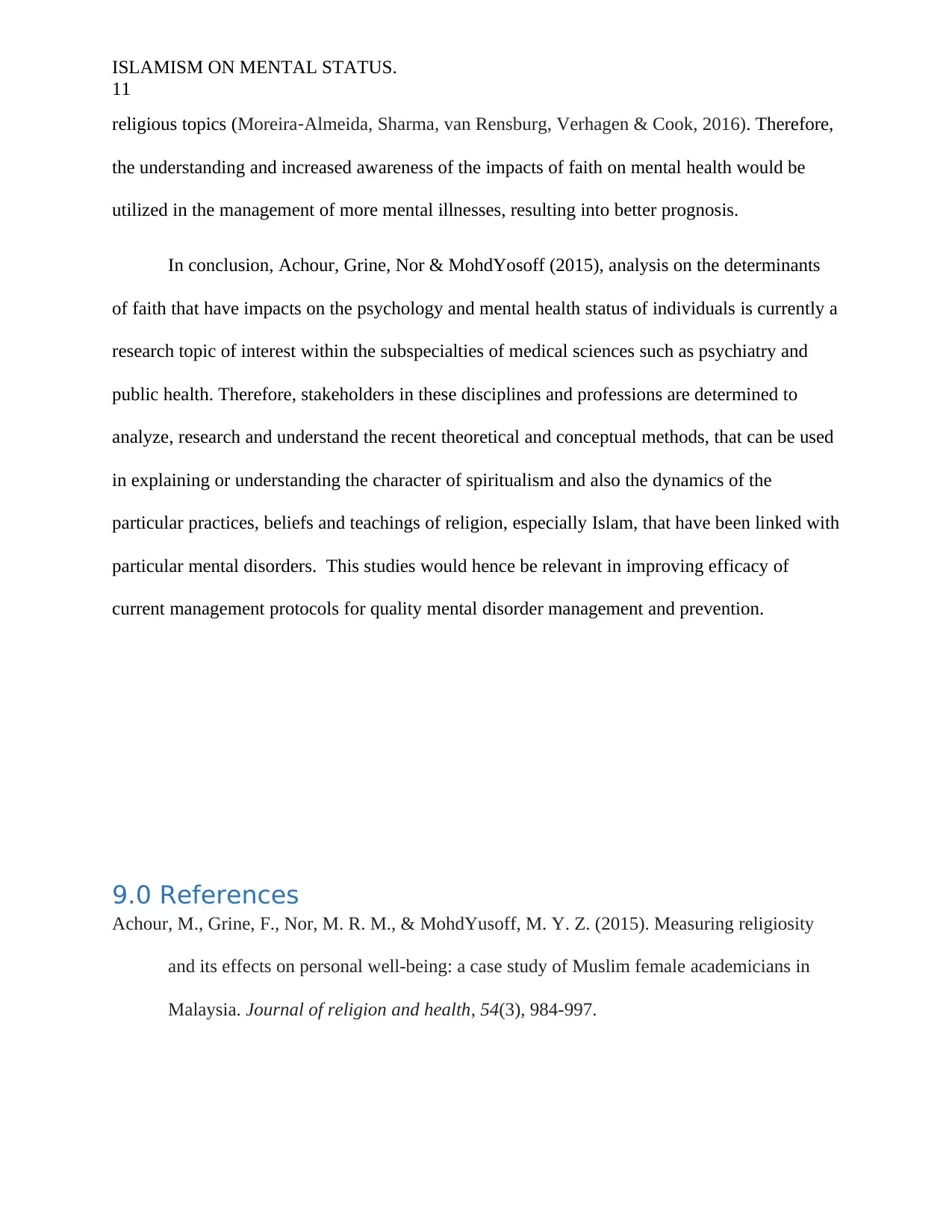
ISLAMISM ON MENTAL STATUS.
11
religious topics (Moreira‐Almeida, Sharma, van Rensburg, Verhagen & Cook, 2016). Therefore,
the understanding and increased awareness of the impacts of faith on mental health would be
utilized in the management of more mental illnesses, resulting into better prognosis.
In conclusion, Achour, Grine, Nor & MohdYosoff (2015), analysis on the determinants
of faith that have impacts on the psychology and mental health status of individuals is currently a
research topic of interest within the subspecialties of medical sciences such as psychiatry and
public health. Therefore, stakeholders in these disciplines and professions are determined to
analyze, research and understand the recent theoretical and conceptual methods, that can be used
in explaining or understanding the character of spiritualism and also the dynamics of the
particular practices, beliefs and teachings of religion, especially Islam, that have been linked with
particular mental disorders. This studies would hence be relevant in improving efficacy of
current management protocols for quality mental disorder management and prevention.
9.0 References
Achour, M., Grine, F., Nor, M. R. M., & MohdYusoff, M. Y. Z. (2015). Measuring religiosity
and its effects on personal well-being: a case study of Muslim female academicians in
Malaysia. Journal of religion and health, 54(3), 984-997.
11
religious topics (Moreira‐Almeida, Sharma, van Rensburg, Verhagen & Cook, 2016). Therefore,
the understanding and increased awareness of the impacts of faith on mental health would be
utilized in the management of more mental illnesses, resulting into better prognosis.
In conclusion, Achour, Grine, Nor & MohdYosoff (2015), analysis on the determinants
of faith that have impacts on the psychology and mental health status of individuals is currently a
research topic of interest within the subspecialties of medical sciences such as psychiatry and
public health. Therefore, stakeholders in these disciplines and professions are determined to
analyze, research and understand the recent theoretical and conceptual methods, that can be used
in explaining or understanding the character of spiritualism and also the dynamics of the
particular practices, beliefs and teachings of religion, especially Islam, that have been linked with
particular mental disorders. This studies would hence be relevant in improving efficacy of
current management protocols for quality mental disorder management and prevention.
9.0 References
Achour, M., Grine, F., Nor, M. R. M., & MohdYusoff, M. Y. Z. (2015). Measuring religiosity
and its effects on personal well-being: a case study of Muslim female academicians in
Malaysia. Journal of religion and health, 54(3), 984-997.
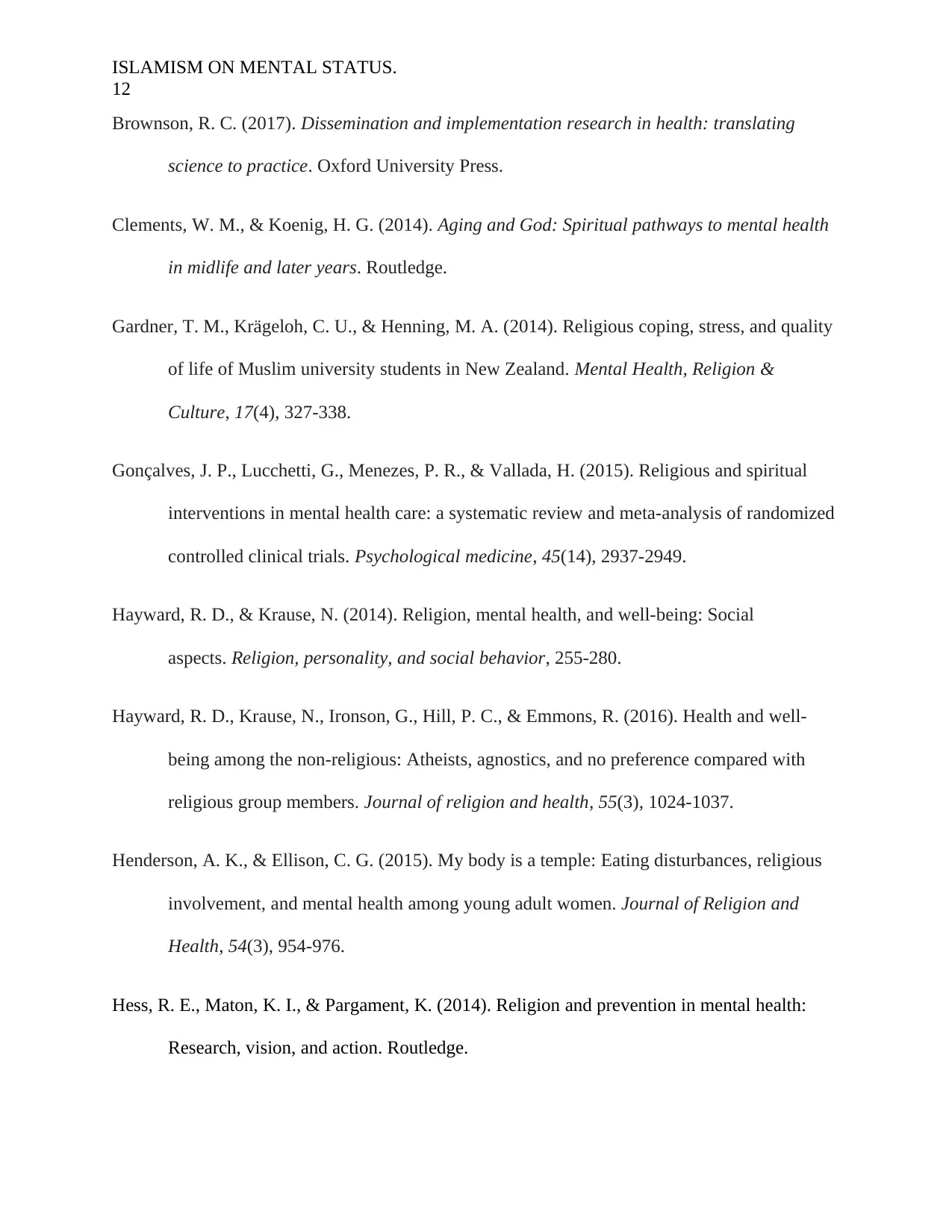
ISLAMISM ON MENTAL STATUS.
12
Brownson, R. C. (2017). Dissemination and implementation research in health: translating
science to practice. Oxford University Press.
Clements, W. M., & Koenig, H. G. (2014). Aging and God: Spiritual pathways to mental health
in midlife and later years. Routledge.
Gardner, T. M., Krägeloh, C. U., & Henning, M. A. (2014). Religious coping, stress, and quality
of life of Muslim university students in New Zealand. Mental Health, Religion &
Culture, 17(4), 327-338.
Gonçalves, J. P., Lucchetti, G., Menezes, P. R., & Vallada, H. (2015). Religious and spiritual
interventions in mental health care: a systematic review and meta-analysis of randomized
controlled clinical trials. Psychological medicine, 45(14), 2937-2949.
Hayward, R. D., & Krause, N. (2014). Religion, mental health, and well-being: Social
aspects. Religion, personality, and social behavior, 255-280.
Hayward, R. D., Krause, N., Ironson, G., Hill, P. C., & Emmons, R. (2016). Health and well-
being among the non-religious: Atheists, agnostics, and no preference compared with
religious group members. Journal of religion and health, 55(3), 1024-1037.
Henderson, A. K., & Ellison, C. G. (2015). My body is a temple: Eating disturbances, religious
involvement, and mental health among young adult women. Journal of Religion and
Health, 54(3), 954-976.
Hess, R. E., Maton, K. I., & Pargament, K. (2014). Religion and prevention in mental health:
Research, vision, and action. Routledge.
12
Brownson, R. C. (2017). Dissemination and implementation research in health: translating
science to practice. Oxford University Press.
Clements, W. M., & Koenig, H. G. (2014). Aging and God: Spiritual pathways to mental health
in midlife and later years. Routledge.
Gardner, T. M., Krägeloh, C. U., & Henning, M. A. (2014). Religious coping, stress, and quality
of life of Muslim university students in New Zealand. Mental Health, Religion &
Culture, 17(4), 327-338.
Gonçalves, J. P., Lucchetti, G., Menezes, P. R., & Vallada, H. (2015). Religious and spiritual
interventions in mental health care: a systematic review and meta-analysis of randomized
controlled clinical trials. Psychological medicine, 45(14), 2937-2949.
Hayward, R. D., & Krause, N. (2014). Religion, mental health, and well-being: Social
aspects. Religion, personality, and social behavior, 255-280.
Hayward, R. D., Krause, N., Ironson, G., Hill, P. C., & Emmons, R. (2016). Health and well-
being among the non-religious: Atheists, agnostics, and no preference compared with
religious group members. Journal of religion and health, 55(3), 1024-1037.
Henderson, A. K., & Ellison, C. G. (2015). My body is a temple: Eating disturbances, religious
involvement, and mental health among young adult women. Journal of Religion and
Health, 54(3), 954-976.
Hess, R. E., Maton, K. I., & Pargament, K. (2014). Religion and prevention in mental health:
Research, vision, and action. Routledge.
⊘ This is a preview!⊘
Do you want full access?
Subscribe today to unlock all pages.

Trusted by 1+ million students worldwide
1 out of 13
Your All-in-One AI-Powered Toolkit for Academic Success.
+13062052269
info@desklib.com
Available 24*7 on WhatsApp / Email
![[object Object]](/_next/static/media/star-bottom.7253800d.svg)
Unlock your academic potential
Copyright © 2020–2026 A2Z Services. All Rights Reserved. Developed and managed by ZUCOL.